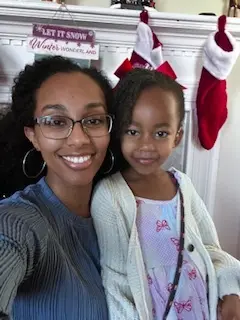Over four years ago, when first telling our families that our youngest daughter was hard of hearing at three months old, we were met with solemn condolences, panic, and denial—feelings of deep unease. But as parents we had already moved on. At that time it was difficult for me to recognize my family’s prolonged reactions, and this caused friction between us. I was perpetually bothered by their simple lack of knowledge on the subject. A family friend, however, who was also our community’s unofficial pediatrician, tried to bridge the gap between me and my family. She assuaged their fears while encouraging me to seek support. She also asked me if I was familiar with a woman named Haben Girma a scholar, advocate, and ‘Habesha’, of Ethiopian or Eritrean descent, like us. She immediately sent me her Ted Talk. I sat captivated as I watched. I learned that Haben was a lawyer by trade, a graduate of Harvard Law, and a fierce disability advocate whose work was born from the inaccessibility she had encountered throughout her life as a Deafblind person.
More recently, I read her memoir, Haben: The deafblind woman who conquered Harvard Law, which appropriately opens with an explanation that deafblindness exists on a continuum — something I don’t think is widely known. Deafness is often assumed to mean total hearing loss, and blindness, complete lack of vision. But in reality, both exist in varying degrees. This can be especially confusing to others when, for example, a deaf person uses their voice to communicate, as both Haben and my daughter do, or when someone who is blind can still use residual vision in some way. I’ve seen this confusion in the blank stares I receive when people learn that my daughter, who primarily communicates through spoken language and uses cochlear implants to help her hear, is Deaf with a capital “D” something that I also often have to explain (more on that later). I appreciate that Haben provides clear examples from across the spectrum to help expand public understanding.
The topic of identity continues to show up in Haben’s memoir which is also rich with cultural touchstones that I cherish and personally identify with. She also shared stories of her family’s refugee experience that were similar to my own parents’. Interestingly, she writes about the distinctions that members of her family, particularly those from the generation before her, make in identifying as Ethiopian or Eritrean, providing context on the complicated political history between the two closely connected countries. As an Ethiopian-American, I appreciated reading about Haben’s family’s lived experiences and how they primarily identify as Eritrean. My own family often holds different perspectives on the Ethiopian-Eritrean conflict, so her story offered a valuable lens that helped me better understand the complexities and regional history from an alternative point of view. It was also compelling to read about how Haben, as a DeafBlind individual, could identify with the injustices her family faced. Though these experiences differ, the theme of loss served as a throughline with her parents’ resilience shaping her determination to persist.
After describing her background as context for her life story, Haben’s book focuses on many prevalent topics surrounding disability. A standout theme and lesson was that “disability itself is not a barrier. The biggest barriers are social, physical, and digital” (Girma, 2019, p. 129). In both her Ted Talk and memoir, Haben tells a story of not having access to her university’s cafeteria menu. She requested that the cafeteria management team email her the menus so her computer’s screen reader could convert the text to digital braille. Her accommodation was not provided consistently, and when challenged the cafeteria manager stated that her expectations were unreasonable and the cafeteria is not required to accommodate her. Although Haben struggles with the idea of feeling grateful simply because others ‘have it worse’, she used the ADA to demonstrate to the cafeteria staff that her request wasn’t a favor—it was a legal obligation. As she describes, this “changed the culture in the cafeteria.” This experience marked her first deep engagement with the Americans with Disabilities Act, which she would later invoke as an attorney representing the National Federation of the Blind. Her work contributed to a District Court of Vermont ruling that the ADA applies to online businesses, not just physical ones, a decision that helped set a legal precedent.
This Global Accessibility Awareness Day, let’s encourage dialogue, reflection, and learning around digital access and inclusion by turning to the work of advocates like Haben Girma. She emphasizes the importance of technological accessibility and points out that individuals with disabilities, the world’s largest global minority group, remain an untapped market without full access to the digital world. She also reminds us that many accommodations benefit everyone, not just those with disabilities. For organizations looking to make their websites more accessible, this 2020 study on the most common accessibility failures is a great place to start.
References:
Girma, H. (2019). Haben: The Deafblind Woman Who Conquered Harvard Law. Twelve.
Girma, H. (2014, October). Why I work to remove access barriers for students with disabilities. [Video]. TEDxBaltimore. Why I work to remove access barriers for students with disabilities | Haben Girma | TEDxBaltimore
Image Source: Rooted in Rights (2019, Aug 6). https://rootedinrights.org/rooted-in-rights-reviews-haben-the-deafblind-woman-who-conquered-harvard-law/

Helina Seyoum
Helina is a consultant, a writer-editor, and a mother of two. She partners with mission-driven organizations to assess, design, and implement equity-centered strategies that are both reflective and actionable. Her passion for accessibility and inclusive storytelling is at the heart of her advocacy.
Have insights to share or want to explore how inclusion can be embedded in your organization? We’d love to hear from you—use the form below to reach out.